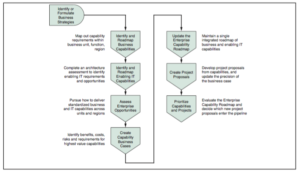Business Capability Roadmapping
Business Capability Roadmapping is a Business Relationship Management approach to aligning Business and IT strategies and imperatives. The techniques helps business relationship managers to:
What is Business Capability Roadmapping?

- Capability conversations increase business acumen
- Encourages strategic versus project thinking
- Roadmap analysis reveals cross-enterprise opportunities to deploy capabilities smarter and faster—cross- BRM collaboration is essential
- Maps supply insights into provider direction and skill planning
- Drives a multi-year vision of the capability at which the company must excel
- Business Capability Roadmapping is considered one of the essential techniques a Bussiness Relationship Manager should have in order to strategically execute his job.
Background of Business Capability Roadmapping
Business Capability Roadmapping is a way to clarify Business Capabilities needed to implement business strategy and the Provider Capabilities needed to enable those Business Capabilities. There are various methodologies and tools available—some proprietary—to support Business Capabilities Roadmapping, including the CEB’s IT Roadmap Builder and the Albright Strategy Group’s Capability Roadmapping.

Business Capability Roadmapping offers a number of important characteristics and benefits:
- Lays out where the business is taking key capabilities over the next 2-3 years to support its strategic objectives.
- Aligns business process, information, application and technology capabilities to a common plan.
- Facilitates strategic thinking versus short-term project thinking.
- Drives conversations that help increase both business and Provider savvyness.
- Roadmap analysis reveals cross-enterprise opportunities to deploy capabilities smarter and faster.
- Maps supply insights into Provider technology direction and workforce planning.
- Business Capability Roadmapping is the crucial set of steps that links from Business Strategy Formulation to IT Project Initiation.
Business Capability Capability Categories
Business Capability
Business capability is the expression or the articulation of the capacity, materials and expertise an organization needs in order to perform core functions. Enterprise architects use business capabilities to illustrate the over- arching needs of the business in order to better strategize Provider solutions that meet those business needs.
A Business Capability can be thought of as the activities a business must perform in order to exist/operate. These are independent of the organization structure, technology and not in a specific sequence. It can be helpful to think of business capabilities in the context of sentences such as, “The Ability to do…” or “Excellence in…” Business Capabilities is the what, not the how of business activity.
Common examples of Business Capability include:
- Drive Brand Equity
- Manage Customer Relationships
- Drive Acquisition Integrations
Enabling IT Capability
An Provider Capability can be thought of as everything it takes behind the scenes that makes an provider service possible. This will include:
- One or more Processes.
- Descriptions of the Roles needed to perform one or more of the procedures within a process (e.g. Project Manager, Business Analyst, and Business Relationship Manager).
- Descriptions of the Competencies needed to perform a given role (what the person performing the role needs to know, e.g. business knowledge, what skills they need, e.g. facilitation, and what behaviours they should exhibit, e.g. results orientation).
- An adequate supply of competent human resources filling the given roles.
- Tools and technologies needed to automate or execute necessary processes or procedures.
- Management systems necessary to ensure the health and performance of the Capability, including funding, organizational will, personal incentives, and so on.
In the context of Business Capability Roadmapping, we can simplify Enabling IT Capability as comprising Information, Applications, and Technology.
